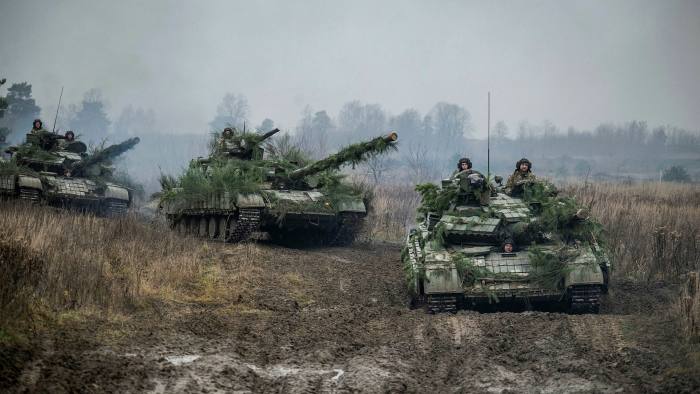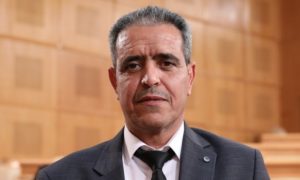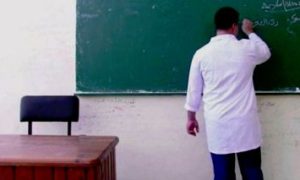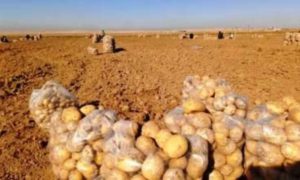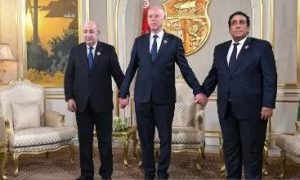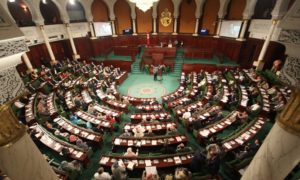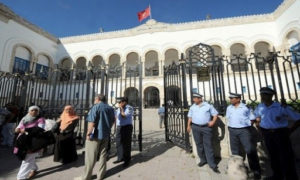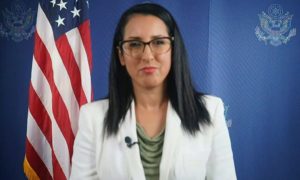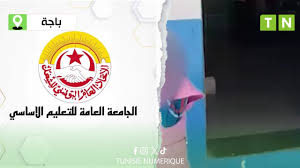Source: Ukrainian Embassy in Tunis
- Russia failed to reach its strategic objectives of occupying entire Ukraine, destroying Ukraine’s statehood and erasing Ukrainian identity. The pro-Ukrainian coalition in the world remains strong and consolidated. On 18 April, the G7 foreign ministers reaffirmed their commitment to support Ukraine for as long as it takes. This commitment was also confirmed by NATO Secretary General Jens Stoltenberg during his visit to Kyiv on 20 April, as well as by participants of the International Summit of Cities and Regions held in Kyiv on 19-20 April;
- Despite ever-growing losses (188,410 in killed as of 26 April), Russia retains its maximalist goals and hopes to turn the tide in the protracted war of attrition, counting on mass mobilization, war fatigue and nuclear blackmailing;
- Ukrainian defenders liberated nearly half of the area occupied by Russian troops since the start of full-scale military invasion. This process will continue until the complete de-occupation of our sovereign territory within the internationally recognized borders;
- Russia wastes thousands of its troops as cannon fodder, but the only place in which it is still trying to advance is Bakhmut, in which Russian invaders use “scorched earth” tactics. Preparations are ongoing for Ukraine’s new counteroffensives, the direction and time of which will be determined by the military command in a due time;
- During the 11th “Ramstein” meeting on 21 April, the main emphasis was placed on strengthening the ground-based air defense system of Ukraine (additional missiles and ammunition for Patriot batteries, NASAMS, and IRIS-T) and the “tank coalition” (maintenance center for Leopard 2 tanks for Ukraine will be created in Poland, and 250 Ukrainian soldiers will begin training on Abrams M1A1 SA tanks);
- The number and scale of Russian missile strikesis decreasing, indicating the depletion of Russia’s stocks of high-precision missiles. Still, Russia continues bombarding Ukrainian cities and villages with S-300 missiles, MLRS, and guided aerial bombs. These attacks leave dead and injured civilians, destroyed and damaged residential buildings, educational institutions, hospitals, churches and other civilian objects;
Russian invaders have stepped up airstrikes on Ukraine with Iranian Shahed drones after receiving a new batch. Iran, along with Russia, bears responsibility for the terror directed against Ukrainians. On 18 April, G7 foreign ministers stated that Iran should stop supporting the Russian military in its war of aggression, in particular, to cease transferring armed UAVs, which have been used in Ukraine. On 25 April, the Government of Ukraine decided to submit to the National Security and Defence Council proposals of sectoral sanctions against Iran;
SECURITY GUARANTEES FOR UKRAINE
- Ukraine signed an application for accelerated accession to NATO: we hope that the Alliance will either determine the timetable for Ukraine’s accession directly at the upcoming summit in Vilnius, or take commitment to present it by the end of 2023. On 10 April, the Verkhovna Rada of Ukraine appealed to NATO Member States to support Ukraine’s accession to the Alliance;
- Today, there are no objective obstacles that would prevent the adoption of political decisions regarding the invitation of Ukraine to the NATO. Until these decisions are made, Ukraine suggests implementing our proposals on the security guarantees (“Kyiv Security Compact”) aimed at mobilizing necessary political, financial, military and diplomatic resources for Ukraine’s self-defense. We expect that a package of security guarantees will be adopted at the NATO summit in Vilnius.
NUCLEAR SECURITY
- Russia holds the Zaporizhzhia Nuclear Power Plant hostage, violating all principles of nuclear and radiation safety. Presence of Russian terrorists on the territory of the largest nuclear power plant in Europe poses a direct threat to the nuclear safety of all mankind. Russia demonstrates its complete disregard for the demands of the international community that call upon it to immediately withdraw its military and other personnel from the ZNPP. Without this withdrawal, any initiatives to restore nuclear security will be doomed to failure;
- Ukraine is doing everything possible to ensure that the operation of the ZNPP is safe. We continue to supply electricity to the ZNPP from the Ukrainian power system, which allows powering the safety systems of the nuclear facility.
FOOD SECURITY
- Even during the full-scale war launched by Russia, Ukraine remains one of the world’s top 5 agricultural exporters, being one of the guarantors of the world’s food security (Ukraine has exported ~59 mln tons of agricultural products);
- Due to Ukraine’s principled position, the Black Sea Grain Initiative (BSGI) was extended after its expiry on 18 March for 120 days. Ukraine continues to export its agricultural products through three deep-sea ports.
- Since 1 August 2022, 28 mln tons of Ukrainian food were exported by sea. This volume could be significantly higher if it was not Russia’s policy of delaying the inspection of vessels. Since 10 April, Russia switched to the direct sabotage of inspections, making unilateral demands on the change of plans for Ukrainian ports. Ukraine categorically rejects Russia’s demands and opposes interference in the activities of Ukrainian ports.
- More than 30 countries and international organizations, including the EU countries, the USA, Canada, UK, Japan, Korea and Qatar, joined the “Grain from Ukraine” humanitarian program launched by President Zelenskyy. The program has already raised >200 mln USD in donations and sent 170,000 tons of wheat to Ethiopia, Somalia, Yemen and Kenya.
ENERGY SECURITY
- Starting from 10 October 2022 and over the next 6 months, Russia carried out 33 massive missile attacks on energy infrastructure facilities, with about 270 hits recorded. As a result, 24 generation facilities (thermal power plants, combined heat and power plants, hydroelectric and pumped storage plants), about half of the transmission system substations, and trunk power grids were affected. Those attacks caused losses of 11 bln USD, according to the assessment by the UNDP and the World Bank. According to the Report of the UN Independent International Commission of Inquiry on Ukraine of 15 March, these attacks may amount to crimes against humanity;
- Russia’s missile terrorist campaign against Ukraine’s energy system has failed. Currently, there is no capacity deficit in Ukraine’s power system, and Ukraine is now even able to export some amount of electricity. However, Russia’s attacks do not stop and repairing the damaged equipment will take months ahead, meaning that power cuts can still be experienced in some regions;
RESTORATION OF JUSTICE
- On 17 March, the International Criminal Court (ICC) issued a life-long arrest warrant against President Putin and Maria Lvova-Belova for alleged war crimes of unlawful deportation of children from occupied areas of Ukraine to the Russian Federation. The ICC’s historic decision marks a turning point in the process of bringing to justice all those guilty of crimes committed in Ukraine, starting with the top leader of the terrorist state;
- Ukrainian law enforcement agencies registered damage or destruction of 98,039 civilian infrastructure facilities, including 76,733 residential buildings and houses, 2,469 educational and 537 medical institutions, 409 cultural and 127 religious buildings, and 4,565 water and electricity These numbers do not include the temporarily occupied areas, in which the real level of destruction is much higher;
- Russian occupiers damaged 1,373 sites of cultural heritage and cultural infrastructure in Ukraine, >550 of them including >60 museums and galleries, were destroyed. We welcome UNESCO’s decision to inscribe the Historic Centre of Odesa on the List of World Heritage in Danger because of the war unleashed by Russia. We are preparing application for the same status for historical center of the city of Chernihiv;
- A number of national parliaments and international bodies recognized Russia as a terrorist state or a state sponsor of terrorism: Parliaments of Lithuania, Latvia, Estonia, Poland, Czechia, Netherlands and Slovakia, as well as the PACE, the NATO PA and the European Parliament. The US Senate made similar call on the Secretary of State.
- Russia has no right to shape further the international agenda. It was ousted from >25 international organizations and other formats of multilateral cooperation and failed to be elected to >44 of its bodies, including the positions of chairs and vice-chairs;
- As expected, Russia used its chairmanship in the UN SC in April to disseminate propaganda and fake narratives, undermining authority of this body. It became another clear indication that the reform of the UN, in particular the Security Council, is long overdue. Ukraine has called on the UN member states to resume the application of the UN Charter in the context of the legitimacy of Russia’s presence in the UN, to deprive it of status of the UN SC permanent member and to exclude it from the UN as a whole.
SANCTIONS
- The sanctions regime should be not only maintained, but also strengthened, in particular in such areas as nuclear energy, IT, diamond sales, maritime logistics, finances etc.
- Personal sanctions must be introduced on pro-Kremlin propagandists, athletes, journalists, and artists, as well as Russian officials involved into illegal deportation of Ukrainian children.
- On 18 April, the G7 foreign ministers confirmed that they remain committed to intensifying, coordinating and fully enforcing sanctions against Russia, including through the Enforcement Coordination Mechanism, and countering Russia’s and third parties’ attempts to evade and undermine sanctions measures;
- The price cap mechanism for Russian oil proved to be effective: Russian oil and gas revenues dropped in the first quarter of this year.
- Strengthening sanctions is needed to ensure that Russia is not able to manufacture and maintain high-tech weapons, most notably missiles attacking civilians. We need to strengthen control over the sale of dual-use goods to Russia and countries friendly to it;
- On 24 February, the G7 reiterated that any resolution to the war must ensure that Russia pays for the damage it has caused.
What's happening in Tunisia?
Subscribe to our Youtube channel for updates.



